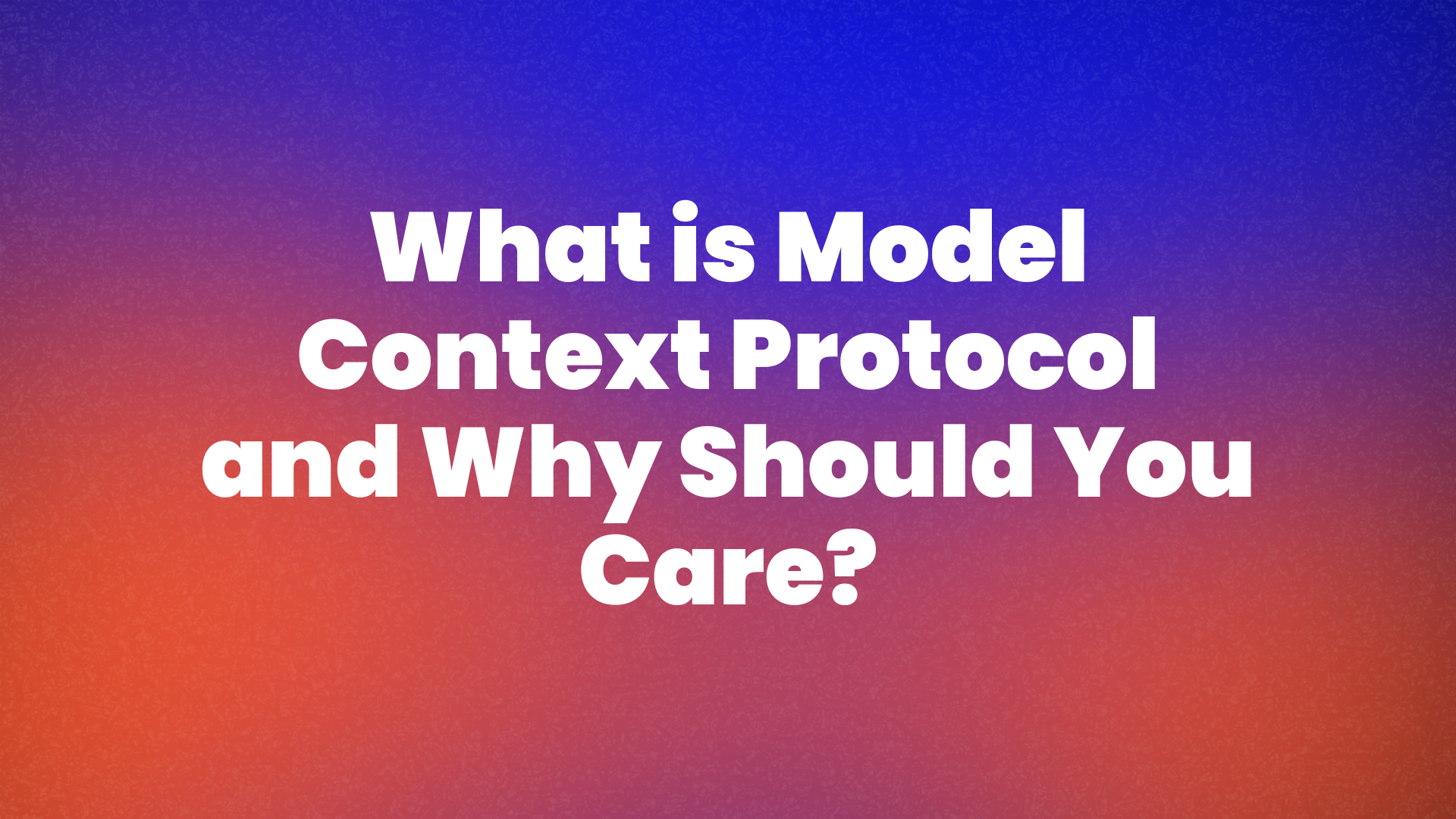What is Model Context Protocol and Why Should You Care?
What is Model Context Protocol and Why Should You Care?
The enterprise AI landscape has reached an inflection point. Whilst organisations have invested heavily in generative AI capabilities, achieving impressive advances in reasoning and quality, even the most sophisticated models remain constrained by their isolation from enterprise data—trapped behind information silos and legacy systems. Every new data source requires its own custom implementation, making truly connected AI systems difficult to scale and sustain.
Enter the Model Context Protocol (MCP)—a breakthrough standard that promises to transform how AI systems access and interact with enterprise knowledge. For IT and business leaders navigating the complexities of AI transformation, understanding MCP isn't just about keeping pace with technological advancement; it's about unlocking the full potential of your organisation's most valuable asset: its data.
The Enterprise Data Challenge
Today's enterprise AI implementations face a fundamental paradox. Whilst foundation models demonstrate remarkable capabilities, their practical utility is severely limited by their disconnection from organisational context. Your company's proprietary knowledge—spanning decades of institutional expertise, customer insights, operational procedures, and strategic intelligence—remains locked away from the AI systems that could leverage it most effectively.
This disconnection manifests in several critical ways:
Fragmented Integration Complexity: Each data source demands its own custom integration, creating a web of bespoke connections that are expensive to build, difficult to maintain, and nearly impossible to scale systematically.
Knowledge Accessibility Barriers: Critical business information remains siloed across disparate systems—from enterprise resource planning platforms to collaborative workspaces—with no unified mechanism for AI systems to discover and access relevant context.
Operational Inefficiency: Without access to enterprise-specific knowledge, AI systems resort to generic responses that require extensive human intervention to align with organisational reality, undermining the productivity gains that justified the initial investment.
Strategic Risk Exposure: Isolated point solutions create ungovernable AI sprawl, where different business units implement disconnected capabilities that cannot be systematically monitored, controlled, or optimised.
Understanding Model Context Protocol
The Model Context Protocol represents a paradigm shift from fragmented, custom integrations to a unified, standardised approach for connecting AI systems with enterprise data sources. Rather than treating each integration as a unique engineering challenge, MCP establishes a universal framework that enables secure, bidirectional connections between AI-powered tools and the systems where organisational knowledge resides.
At its core, MCP operates through a client-host-server architecture designed for enterprise-grade deployment:
MCP Servers connect directly to your data sources and applications—whether content repositories, business tools, or development environments—exposing specific capabilities through a standardised interface. These servers provide three fundamental interaction types: prompts (pre-defined templates for common tasks), resources (structured access to files, databases, and system information), and tools (functions that enable AI systems to take concrete actions).
MCP Clients handle the technical communication between AI applications and your data sources, managing authentication, security policies, and data flow according to your governance requirements.
MCP Hosts serve as the central coordination layer within your AI applications, controlling permissions, managing multiple connections, and ensuring that AI interactions align with organisational policies and security frameworks.
This architecture delivers what custom integrations have struggled to achieve: a scalable, maintainable approach to AI-data connectivity that can evolve with your technology landscape without requiring fundamental redesign.
The Strategic Imperative for Enterprise Leaders
For organisations serious about AI transformation, MCP addresses several strategic imperatives that extend far beyond technical efficiency:
Unlocking Enterprise Knowledge at Scale
Your organisation's most valuable competitive advantage lies not in publicly available information but in the proprietary knowledge accumulated through years of market experience, customer relationships, and operational refinement. MCP provides the mechanism to systematically connect AI systems with this institutional intelligence, transforming generic foundation models into enterprise-specific knowledge assets that reflect your unique context and expertise.
This capability enables AI systems to deliver responses grounded in organisational reality rather than generic best practices, dramatically improving relevance and reducing the human intervention required to make AI outputs actionable.
Accelerating Productivity Through Contextual Intelligence
The productivity potential of generative AI remains largely unrealised when systems lack access to the specific information needed to complete real work. MCP enables AI applications to automatically retrieve relevant context from across your enterprise, whether that's historical project data for strategic planning, customer interaction history for relationship management, or technical documentation for problem resolution.
This contextual grounding transforms AI from a research assistant into a genuine productivity multiplier, capable of producing outputs that directly advance business objectives without requiring extensive manual adaptation.
Establishing Sustainable AI Architecture
Perhaps most critically for IT leaders, MCP provides a foundation for sustainable AI scaling. Rather than accumulating technical debt through countless custom integrations, organisations can build once and leverage repeatedly, creating reusable capabilities that compound in value as new use cases emerge.
This architectural approach enables systematic governance of AI-data interactions, providing the visibility and control mechanisms necessary for enterprise-grade deployment whilst maintaining the flexibility to adapt as both technology and business requirements evolve.
Transforming Enterprise Operations
The practical implications of MCP extend across every dimension of enterprise operations, creating new possibilities for AI-enhanced productivity:
Knowledge Management Revolution: Traditional knowledge management systems require users to know what information exists and where to find it. MCP-enabled AI systems can proactively discover and synthesise relevant information from across the enterprise, transforming institutional knowledge from a static repository into an active intelligence layer that anticipates and responds to business needs.
Decision Support Enhancement: Strategic decision-making traditionally relies on manual analysis of disparate information sources, creating bottlenecks and potential oversights. With MCP providing systematic access to enterprise data, AI systems can rapidly synthesise relevant context from multiple sources, enabling faster, more informed decision-making whilst maintaining transparency about information sources and reasoning paths.
Operational Process Optimisation: Beyond information access, MCP enables AI systems to take concrete actions within enterprise applications—updating records, triggering workflows, generating reports, and coordinating activities across systems. This bidirectional capability transforms AI from a passive advisor into an active participant in business processes.
Customer Experience Advancement: Customer-facing AI applications benefit enormously from access to enterprise context, enabling personalised interactions based on relationship history, product usage patterns, and organisational knowledge. MCP provides the secure mechanism for delivering this contextual intelligence without compromising data privacy or security.
Implementation Considerations for Enterprise Leaders
Whilst MCP offers compelling strategic advantages, successful implementation requires careful attention to several critical factors:
Security and Governance Frameworks
Connecting AI systems to enterprise data demands robust security controls and governance mechanisms. Successful MCP implementations establish clear data access policies, implement comprehensive audit trails, and provide granular permission management to ensure AI interactions align with organisational security requirements and regulatory obligations.
Integration Strategy and Prioritisation
The breadth of potential MCP applications can overwhelm organisations lacking clear implementation strategies. The most successful approaches begin with high-value, low-risk use cases—typically knowledge management applications that provide immediate productivity benefits whilst building organisational confidence and technical capability.
Change Management and Capability Development
MCP implementation requires new competencies across technical and business teams. Organisations must invest in prompt engineering capabilities, AI orchestration skills, and governance expertise to maximise the value of connected AI systems whilst maintaining appropriate oversight and control.
Technology Architecture Alignment
MCP implementations must align with existing enterprise architecture, considering factors like data residency requirements, compliance obligations, and integration with legacy systems. Successful deployments often employ hybrid approaches that balance public cloud capabilities with private infrastructure for sensitive applications.
The Competitive Advantage of Early Adoption
Organisations that embrace MCP early gain several sustainable competitive advantages:
Knowledge Velocity: The ability to rapidly access and synthesise enterprise knowledge provides significant speed advantages in strategic planning, problem resolution, and opportunity identification.
Operational Efficiency: Systematic AI integration reduces manual effort across numerous business processes, freeing human resources for higher-value activities that require creativity, relationship management, and strategic thinking.
Innovation Capability: Connected AI systems can identify patterns and opportunities across enterprise data that might remain invisible through traditional analysis approaches, driving innovation in products, services, and operational methods.
Talent Attraction and Retention: Modern knowledge workers increasingly expect AI-enhanced environments that amplify their capabilities rather than replacing them. MCP-enabled systems provide this enhancement whilst maintaining human agency and expertise.
Building the Foundation for AI-Native Operations
The transition to MCP represents more than a technology upgrade—it signals the evolution toward AI-native enterprise operations where artificial intelligence becomes integral to every business process rather than an occasional supplement.
This transformation requires leadership commitment to building comprehensive foundations that span people, process, and technology domains. Organisations must develop new governance frameworks, invest in technical infrastructure, and cultivate human capabilities that complement rather than compete with AI systems.
The enterprises that approach MCP as fundamental infrastructure rather than another point solution will create lasting capabilities that compound in value over time, positioning themselves for sustainable competitive advantage in an increasingly AI-driven business environment.
Conclusion: The Strategic Imperative
The Model Context Protocol represents a watershed moment in enterprise AI evolution. For the first time, organisations have access to a standardised, scalable approach for connecting AI systems with the proprietary knowledge that drives competitive advantage.
The question facing enterprise leaders isn't whether to embrace MCP, but how quickly and systematically they can implement it to unlock their organisation's knowledge potential. Those who begin this architectural journey today will be best positioned to harness the transformative power of contextually intelligent AI systems.
The future belongs to organisations that can seamlessly blend human expertise with artificial intelligence, creating synergistic capabilities that exceed what either could achieve independently. MCP provides the technical foundation for this future—the strategic question is whether your organisation will lead or follow in its realisation.


